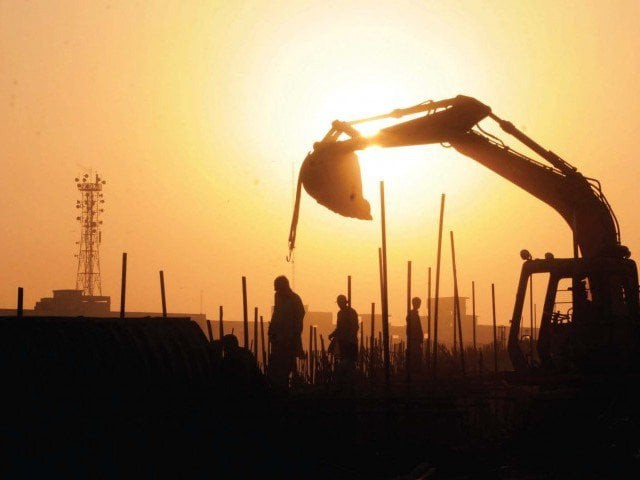34.5% for ADP in Rs603 billion K-P budget
Rs45.2bn tax and non-tax revenue target amounts to just 7.4% of total outlay

PHOTO: EXPRESS
K-P Finance Minister Muzaffar Said announced the budget amid protest from opposition lawmakers who were chanting ‘Go, Imran Go’.
The outlay is 19% higher than the Rs505 billion in the outgoing fiscal year. However, it includes a massive Rs52.7 billion worth of foreign loans and Rs10 billion domestic loans as well as Rs45 billion cash escalation expected from the federal government in terms of share in tax collection and net profit on hydel power generation.
The K-P government expects Rs425 billion from the federal government which is around 11.8% higher than the Rs380 billion in outgoing year. But the provincial government cannot benefit from this increase because of the rapidly increasing amount it needs to spare for employees salaries and pensions. The salaries and pensions will put an extra burden of Rs41 billion on government kitty.
Budget 2017-18: K-P proposes 57 projects in power sector
In 2008-09, expenditure on pensions were just Rs5.7 billion while in 2017-18, it has reached a whopping Rs53 billion. Similarly, expenditures in terms of salaries and allowances will touch a massive Rs218 billion.
Ambitious revenue figures:
The provincial government has set the tax and non-tax collection at Rs45.2 billion for 2017-18 which only amounts to 7.4% of the total outlay.
Last year, the government had set a revenue target of Rs49.5 billion and collected just Rs20.9 billion in the first 10 months of the fiscal year.
The government expects to raise Rs22.3 billion from tax revenue and Rs22.9 from non-tax revenue.
The non-tax revenue includes Rs8.2 billion from commercialisation of government properties – a pipe dream which could not be materialised in the outgoing year. But this year again, the government forced the finance managers to include the project in the budget.
Budget 2017-18: K-P govt to allocate Rs138b for education
Last year, the K-P government had Rs11.8 billion in its kitty, but this year, it has Rs24.8 billion in hand which shows good cash management on the part of the K-P finance department.
ADP:
The minister proudly stated that the ADP 2017-18 had been increased to Rs208 billion – or by 29% – when compared with Rs161 billion in the outgoing fiscal year.
The ADP contains Rs82 billion in foreign project assistance -- including Rs52.7 billion in loans from the Asian Development Bank (ADB) for the Peshawar Mass Transit – while the remaining Rs29.4 billion will be foreign grants. As much as Rs126 billion will be also spent from the province’s own resources.
Last year, the provincial component of the ADP was Rs125 billion.
The K-P government appeared to have violated its own local government law while distributing development funds.
Under the K-P Local Government Act of 2013, the K-P government should have allocated not less than 30% of the total ADP to the ADP of districts. But in effect, only Rs28 billion has been earmarked for the district ADPs amounting to just 22.2% of the provincial ADP.
The ADP contains 1,632 development schemes, including 1,182 ongoing projects for which Rs78.8 billion has been earmarked and 450 new schemes for which Rs47.1 billion has been set aside. New schemes also include 84 projects related to the China Pakistan Economic Corridor (CPEC).
“We have placed more money for ongoing schemes so that projects can be completed quickly,” said the finance minister.
The throw-forward liability of the ADP has reached Rs567 billion, meaning that the next government would need 4.5 years to clear the backlog of ongoing schemes without starting new schemes. Last year, the throw-forward liability was Rs488.5.
Along with Rs52.7 billion in ADB loan, the K-P government also plans to borrow Rs10 billion from domestic banks as well as Rs15 billion from the Hydel Development Fund (HDF).
The government had put Rs12 billion domestic loan provisions in budget 2016-17, but it did not borrow the money.
“This year we will still not go for domestic loans. But we are keeping it in the budget to be able to cope with any emergency arising after any natural catastrophe,” said an official of the finance department.
Following in the footsteps of the federal government, pensions of the government employees was increased by 10%.
Major allocations:
The PTI again prioritised the education and health sectors in terms of allocations.
It set aside Rs136.1 billion for elementary and secondary education, Rs11.9 billion for higher education, Rs65.6 billion for health, Rs39.7 billion for law and order, Rs7 billion for debt servicing, Rs2.9 billion for wheat subsidy, Rs9.6 billion for agriculture sector, Rs6.6 billion for communications and works, Rs4.4 billion for public health engineering and Rs7.1 billion for relief and rehabilitation.
The finance minister also presented Rs47.5 billion revised budget for the outgoing year 2016-17 including Rs27.9 billion for development expenditures and Rs19.2 for current expenditures.
Taxes:
Although the minister claimed not including any new taxes in the budget, but the finance bill shows imposition of professional tax on all those earning more than Rs10,000 a month.
Every professional or trader earning Rs10,000 to 20,000 a month would pay Rs330 tax per annum. The professional tax will be Rs 435 per annum for those earning between Rs20,000 and 50,000 a month; Rs600 for those drawing Rs50,000 and 100,000 per month; Rs800 for those earning between Rs100,000 and 200,000 per month; and Rs1,000 for those earning between Rs200,000 and Rs500,000 a month.
The government also imposed tax on federal and provincial government employees from BPS-5 and above. It also increased the motor vehicle tax and property tax on different categories of localities in the province.













COMMENTS
Comments are moderated and generally will be posted if they are on-topic and not abusive.
For more information, please see our Comments FAQ